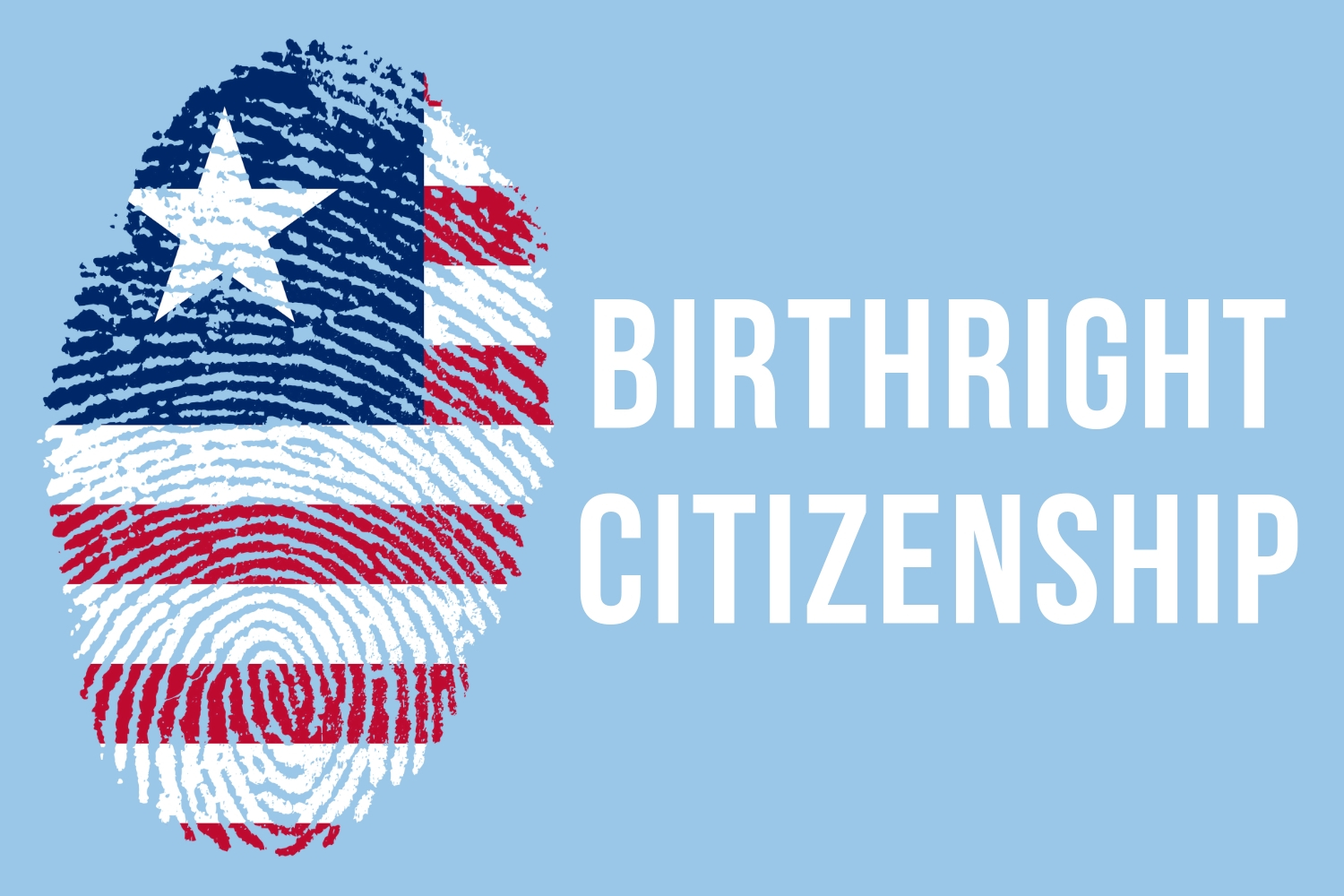Trends
Donald Trump Wants To Do Away With US Birthright Citizenship, But Can He Change The Law? Has Birthright Citizenship Been Challenged in Other Countries?
Donald Trump is back in the spotlight, and with his eyes set on the White House (again), he’s reviving one of his most controversial promises ending birthright citizenship.
Published
1 year agoon

Donald Trump is back in the spotlight, and with his eyes set on the White House (again), he’s reviving one of his most controversial promises ending birthright citizenship.
If he gets his way, the long-standing principle that has been a cornerstone of American identity for over 150 years could face a seismic shift. But let’s cut to the chase—can he actually pull this off, or is this another Trumpian pipe dream?
What’s the Deal with Birthright Citizenship?
Birthright citizenship, or jus soli (a fancy Latin term meaning “right of the soil”), guarantees that anyone born on US soil is automatically a US citizen. It doesn’t matter if your parents arrived in America last week or have been here for generations—if you’re born in the US, you’re in.
This principle is enshrined in the 14th Amendment, ratified back in 1868, during a time when America was trying to heal the wounds of the Civil War.
Here’s the key line –
“All persons born or naturalised in the United States, and subject to the jurisdiction thereof, are citizens of the United States and of the State wherein they reside.”
The amendment was a direct response to the infamous Dred Scott decision, which denied citizenship to African Americans. Fast forward to 1898, and the Supreme Court’s ruling in United States v. Wong Kim Ark cemented the idea: if you’re born on US soil, you’re a citizen, period.
Why Does Trump Want to End It?
Trump’s argument boils down to this – birthright citizenship, in his view, is a “magnet” for illegal immigration. During a recent NBC interview, he said, “You have rules, regulations, laws. They came in illegally.” For him, ending birthright citizenship is part of a larger crackdown on immigration, which he sees as a pressing issue.
So what does he propose? Executive action. Trump has promised that on Day One of his potential presidency, he’ll sign an executive order aimed at ending birthright citizenship. Sounds bold, right? But there’s a catch—a big one.
Can He Actually Do It?
Here’s where things get tricky for Trump. The 14th Amendment isn’t some random policy—it’s the Constitution. And no president, no matter how ambitious or controversial, can rewrite the Constitution with the stroke of a pen.
Michael LeRoy, a legal expert, puts it bluntly: “No president has the authority to eliminate or modify a constitutional amendment.” Even if Trump tries issuing an executive order, it would likely be struck down as blatantly unconstitutional.
That said, Trump’s team may try to get creative. Some of his allies have floated the idea of denying federal documents, like Social Security cards and passports, to children of undocumented immigrants. While this wouldn’t change citizenship law directly, it could trigger years of legal battles—and even more division.

Is Trump’s Vision to Alter Birthright Citizenship Something New?
If you think Donald Trump is treading uncharted waters with his proposal to end birthright citizenship, think again. Efforts to challenge or reinterpret this constitutional guarantee are older than the man himself.
The debate over the phrase “subject to the jurisdiction thereof” in the 14th Amendment has sparked legal battles and philosophical arguments for over a century. But is this latest push just another page in the same book, or is Trump rewriting the narrative entirely?
A History of Controversy
The 14th Amendment may seem straightforward on the surface, but its interpretation has always been nuanced. Back in 1884, the Supreme Court ruled that Native Americans born on reservations were not US citizens because they fell under tribal, not federal, jurisdiction. It wasn’t until decades later, through additional legislation, that all Native Americans were granted citizenship.
More recently, American Samoans—classified as “non-citizen nationals”—have sought citizenship under the 14th Amendment, only to face rejection by the courts. These examples highlight the complex legal gymnastics often required to define who qualifies as “subject to the jurisdiction” of the United States.
So no, Trump isn’t the first to question birthright citizenship. But his approach, which leans on executive power rather than legislative or judicial pathways, certainly raises eyebrows.
Historically, the idea of granting citizenship has often been tied to expansion and stability. Take ancient Rome, for example. In 212 AD, Emperor Caracalla extended citizenship to all free men and women within the empire—a move designed to unite diverse populations and bolster economic and political stability.
Trump’s vision, on the other hand, moves in the opposite direction. By proposing restrictions on birthright citizenship, coupled with mass deportations, the aim seems less about unity and more about exclusion. It’s a stark contrast to historical precedent and one that has already sparked fierce debate.
What About the Workforce?
Let’s talk numbers. Trump’s broader immigration agenda includes deporting millions of undocumented immigrants, including their US-born children. Experts warn that such moves could send shockwaves through key industries.
Think about it – who will fill the roles in agriculture, construction, and healthcare—the backbone of America’s economy? Labour shortages in these sectors are already a concern, and deporting millions of workers would only aggravate the problem.
Adding to the controversy is Trump’s suggestion of denaturalising citizens. While denaturalisation is rare and typically reserved for cases involving treason or fraud, expanding its scope would undoubtedly face fierce legal challenges and public pushback.
So can the 14th Amendment Be Altered?
In a word: unlikely.
The 14th Amendment isn’t something that can be tweaked with an executive order. To change it would require a constitutional amendment, demanding overwhelming support from Congress and ratification by 38 states. Given the current political scene, that’s a long shot.
The courts, too, have historically upheld the principle of birthright citizenship. While Trump’s vocal allies, including Senators Tom Cotton and Marsha Blackburn, support his proposal, any significant shift would almost certainly end up before the Supreme Court. And let’s be honest—rewriting a cornerstone of American identity isn’t something the judiciary would take lightly.

Has Birthright Citizenship Been Challenged in Other Countries?
The debate over citizenship by birth isn’t exclusive to the United States; several countries have mulled with, and even altered, their approach to jus soli (right of the soil) over the years. Many nations initially embraced unconditional jus soli but later shifted to more restrictive models as immigration patterns changed.
Let’s take a quick trip around the world to see how this contentious issue has played out elsewhere.
Ireland
Ireland was the last country in the European Union to grant automatic citizenship to anyone born on its soil, regardless of parental status. However, in 2004, a constitutional amendment ended this practice following concerns about “citizenship tourism,” where individuals traveled to Ireland specifically to give birth and secure citizenship for their children.
France
France offers a modified version of jus soli. Children born in France to foreign parents must meet certain conditions—such as residing in the country for a specific period—before they can claim citizenship. This adjustment aimed to balance immigration control with the country’s historical commitment to equality.
Australia
Until 1986, Australia granted birthright citizenship to all children born on its soil. However, concerns about undocumented immigration led to a policy shift. Now, at least one parent must be an Australian citizen or permanent resident for a child born in Australia to receive citizenship at birth.
United Kingdom
Similar to Australia, the UK ended unconditional jus soli in 1983. A child born in the UK is now granted citizenship only if at least one parent is a citizen or legally settled in the country.
A Global Trend Toward Restrictions
Out of nearly 200 countries, fewer than 30 still practice unconditional birthright citizenship, and most of these are in the Americas. Nations like Canada, Mexico, and Brazil continue to uphold jus soli, reflecting their immigration-friendly ethos and history of welcoming diverse populations.
In contrast, many European and Asian nations have long adhered to jus sanguinis (right of blood), where citizenship is determined by ancestry rather than birthplace. Germany, for instance, primarily follows jus sanguinis but allows for exceptions, granting citizenship to children born to long-term residents under specific conditions.
Why the Shift?
The move away from unconditional birthright citizenship often stems from concerns about immigration and national identity. Critics argue that automatic citizenship can incentivize undocumented immigration and create “anchor baby” scenarios. Proponents of change frequently cite the need for tighter immigration control and the challenges of integrating diverse populations.
However, these shifts don’t come without controversy. Opponents argue that restricting birthright citizenship can create stateless individuals or second-class citizens, exacerbating social inequalities and undermining the inclusive values many nations claim to uphold.
The Last Bit
Trump’s proposal, if implemented, would place the US alongside countries like Ireland and Australia, which have moved away from unconditional jus soli. But unlike these nations, the US faces a unique challenge: its birthright citizenship is explicitly enshrined in the Constitution.
While other countries have altered their laws through legislative processes or referendums, the US would need to overcome significant constitutional hurdles—a feat that would likely ignite a protracted legal and political battle.
Still, if Trump follows through, we’re looking at a political and legal firestorm – if Trump pushes this agenda, the fight won’t just be in Congress or the courts. It’ll spill into the national conversation, fueling debates about what it truly means to be American.
So, will he? The odds are against it. But as history has shown, Trump thrives on controversy—and this promise is no exception.
You may like
-


Taiwan’s ‘Historic’ TSMC Deal, A Win Or The End Of Its ‘Silicon Shield’ As China Threatens? A Jittery Taiwan Watches Trump’s Moves On Ukraine, Wondering, Could We Be Next?
-


America And China’s Thirst For Gold In 2025 Is Draining Other Countries’ Reserves; Here’s Why?
-


Germany’s Friedrich Merz’s Big Balancing Act—Trump, Borders & Europe’s Future. Can He Deliver?
-


United Kingdom To Unleash Its ‘Harshest’ Sanctions On Russia Yet—But Will They Bite? How Trouble Is Brewing For Keir Starmer At Home. Shamed For Volunteering British Troops In Ukraine
-


How It’s Not Trump But Vladimir Putin That Europe Is Stinging From: Trump’s U-Turn On Europe, Russia’s Strong Supply Chain—A Formidable Opponent!
-


Is Ukraine Now Stuck In The US-Russia Ecosystem? Could Zelensky Have Made A Deal To Stop The War, Is Trump Right?
